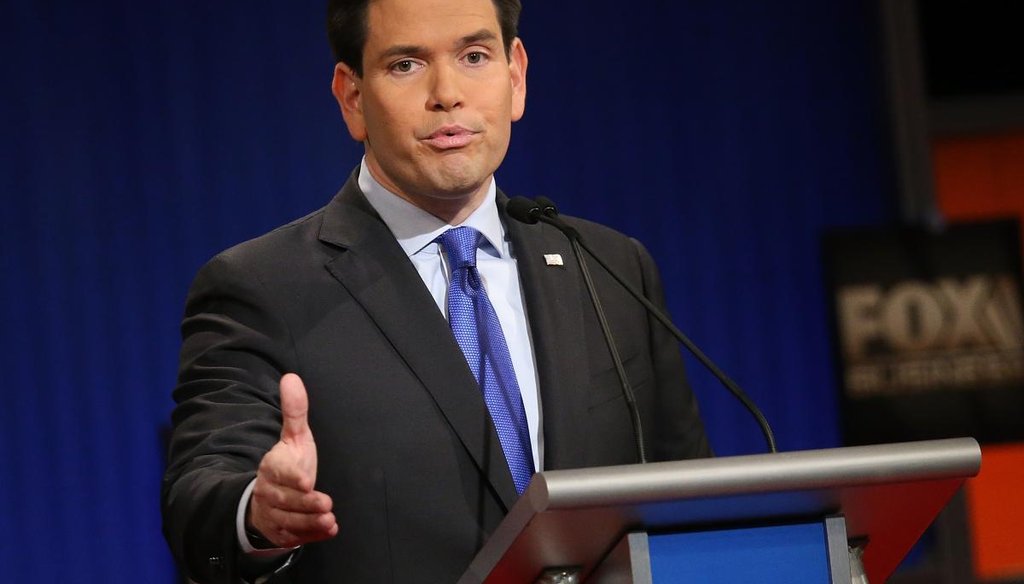Stand up for the facts!
Our only agenda is to publish the truth so you can be an informed participant in democracy.
We need your help.
I would like to contribute

Sen. Marco Rubio, R-Fla, at the Republican presidential debate in South Carolina. (Getty)
On the Sunday shows, presidential candidates reacted with vehemence to the weekend's news of Iran releasing American hostages as the two countries implemented a major nuclear agreement.
On the left, Sen. Bernie Sanders of Vermont hailed the news of the hostages' release and offered kudos to President Barack Obama. On the right, Sen. Marco Rubio of Florida said Obama had set a bad example that would encourage America's enemies.
Both Sanders and Rubio cited past events to support their views, and in both cases, they exaggerated the facts.
First, we'll take Rubio.
Republicans weren't pleased by Obama's actions on Iran. Rubio said on Meet the Press that the United States should not have made any concessions to Iran. Part of the deal included Obama granting clemency to seven Iranians charged in U.S. courts with violating economic sanctions against Iran.
"When I become president of the United States, our adversaries around the world will know that America is no longer under the command of someone weak like Barack Obama, and it will be like Ronald Reagan, where as soon as he took office, the hostages were released from Iran," Rubio said.
Rubio's statement rates Pants on Fire as a highly misleading framing of history. Reagan's inauguration in 1981 may have coincided with the release of the hostages, but historians say it did not cause it. Instead, the Iranians had tired of holding the hostages, while the administration of President Jimmy Carter did the legwork to get the hostages released. (We asked the Rubio campaign for response but did not hear back.)
In 1979, Islamic revolutionaries overthrew the Shah of Iran, who had been installed and supported by successive U.S. administrations. Militants took over the American embassy and held 52 hostages from Nov. 4, 1979, until Jan. 20, 1981 — the day Carter passed the reins to Reagan, who had defeated him amid widespread public disapproval of Carter's handling of the crisis.
But negotiations for the hostages' release started well before Election Day. In September 1980, the Iranians contacted the Carter administration with a proposal. The Iranians believed that they had extracted most of the benefits from holding the hostages and feared having to start negotiations over with a new administration, according to historians.
On the day of the inauguration, Carter informed Reagan at 8:31 a.m. that the release of the hostages was imminent, according to a report in the New York Times. The hostages left Tehran at 12:25 p.m., and Reagan announced the news at 2:15 p.m. at a luncheon with congressional leaders.
Despite the showy announcement, scholars of the period say Reagan did not play any significant role in freeing the hostages.
"Well before Reagan became president, the deal for releasing the hostages had already been worked out by the Carter administration's State Department and the Iranians, ably assisted by Algerian diplomats," said David Farber, author of Taken Hostage: The Iranian Hostage Crisis and America's First Encounter with Radical Islam.
Rubio's comments are a clear misreading of history, said Michael Gunter, professor of political science at Tennessee Technological University, who has authored several papers on the 1981 hostage release.
"It is clear that Sen. Marco Rubio is falling back on an exaggerated urban legend that the only way to deal with Iran is through implied threats of military retaliation, as President Reagan supposedly did," he said. "Actually, successful U.S. diplomacy then and now played the most significant role."
Sanders attacks Clinton
On Meet the Press, host Chuck Todd asked Sanders if he thinks Iran is still an enemy of the United States. Sanders answered the question by attacking his Democratic primary opponent, former Secretary of State Hillary Clinton.
"If you think back to 2007 during the campaign in which Secretary Clinton ran against Barack Obama, she was critical of him," Sanders said. "A question was asked to Obama that said, 'Would you sit down and talk to the Iranians?' And he said, 'Yeah, I would.' … Secretary Clinton, I think, called him naive. Turns out that Obama was right."
At one point, Clinton did describe an Obama statement on diplomacy as "naive," but Sanders is leaving out important nuance. His statement rates Half True.
This all started at a July 2007 Democratic presidential debate that included questions from YouTube users. One asked if the candidates would be willing to meet "without precondition, during the first year of your administration, in Washington or anywhere else" with the leaders of Iran, Syria, Venezuela, Cuba and North Korea.
Obama was first to respond, saying he would. Clinton said she would approach adversaries differently than President George W. Bush, but that she would not necessarily meet with these leaders without preconditions. Instead, she would first send envoys.
Clinton's "naive" comment came the next day in an interview with the Quad-City Times in Iowa: "I thought that was irresponsible and frankly naive to say he would commit to meeting with Chavez and Castro and others within the first year. As I said last night, there has to be a lot of diplomatic effort."
Sanders made it sound like Clinton shut the door on diplomacy, when in reality she was supportive of diplomacy, though she advocated for a more cautious approach than Obama.
Our Sources
See individual fact-checks.















































